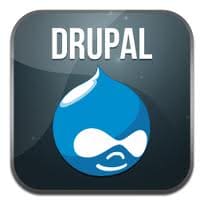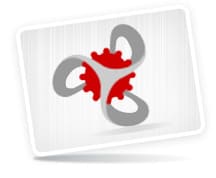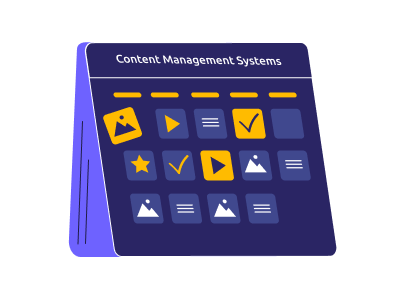Content Management System (CMS) have become an integral part of the processes like data management and setting up an impressive and resourceful website. When it comes to selecting a CMS, there are a wide range of options available. The perfect selection of CMS is dependent on the factors like:
• What features you are looking for in a CMS
• The language used for creating it
• Who is going to be using it
• The reason for which you need it
It is a fact that some content management systems have an edge on the rest of the content management systems present in the market. Selecting the right one can be a difficult task.
Have a look at these 6 most usable content management systems:

Frankly, there is nothing more left to be said about the most epic content management system – WordPress!. This PHP blogging platform has become the most popular content management system for blogging and overall the most largely accepted CMS. It is also the most suitable platform for beginners. Not to mention the fact that the latest versions have the function of auto-update for the plugins present in the backend, this can be done without downloading a single file.
Another great thing is that the backend is perfectly streamlined and it is intuitive as well. This is the main reason why the new users get accustomed to the interface so well. WordPress is also equipped with built-in image and multimedia support. WordPress also has the widest community of plugins and themes to select from. The ever growing WordPress community provides you with online documentation of almost every aspect of customizing WordPress. In short, WordPress is highly functional!

Drupal is another content management system that consists of a wide spread and active community. Instead of concentrating on blogging as a platform, Drupal is more of a content management system. A plain installation process is provided with many optional modules through which you can add many interesting features like user blogs, forums, OpenID, profiles and much more. It is a slightly difficult task to create a website with social features with just a simple Drupal installation. In fact, is you install some 3d party modules, you can create some amazing site clones with minimum efforts.
One of the most widely used and popular module of Drupal is Taxonomy. The Taxonomy module enables you to have multiple levels and many categories for various content types.
Drupal also has an active community powering it. Moreover, excellent support is provided for plugins and other general questions.

When it comes to functionality, Joomla is considered to be an advanced CMS. Having said that, getting started with Joomla is extremely simple; all thanks to the Joomla Installer! Joomla’s installer works perfectly with the common shared hosting packages.
In terms of interface, Joomla is somewhat similar to Drupal. The administration panel provided by Joomla is attractive and simple, it features intuitive drop-down menus and many other useful features. This CMS also provides with a good support for accessing the control protocols like LDAP, OpenID and also for gmail.com.
An amazing fact – Joomla provides with more than 3,200 extensions. Just like WordPress, you can add any desired functionality in Drupal by adding an extension. However, the Joomla community is largely dependent on paid plugins and themes so if you are looking for customization, you must be ready to pay.
Moodle

The Moodle content management system is specifically used for any eLearning portal or for any learning management system (LMS) or for a Virtual Learning Environment (VLE). Moodle is also known as a course management system. The aim behind creating Moodle is to help the educators to create online courses along with opportunities for improved interaction. The Moodle CMS can easily be extended by creating plugins for any new and specific functionality. Moodle is extremely popular and one of the most widely used LMS in the world. The most attractive feature of Moodle is that it can be up and running within a week or two. This is an open source software that is free of cost and can be used for various online courses and educational websites.
Moodle has created its place in the international learning environment as it is fast, flexible and adaptable. Moodle has a huge scope – It consists of subscription tools through which you can receive information like RSS feeds, calendar feeds, you can add MS Outlook. In short, Moodle is a complete package for the educational sector.

If you are looking for a content management system for your Wikipedia website, then MediaWiki is the best bet! This CMS is not just powerful but it is also extremely versatile and perfect for any type of wiki website. The beauty of MedaiWiki is that it has a wide capability and at the same time, it is one of the simplest applications to use. MediaWiki has a simple interface and it is easy to work with it without much training. Content can also be easily managed through MediaWiki.
MediaWiki enables easy information sharing with people. The most amazing features are that it is extremely powerful, it is scalable and feature-rich.

DotNetNuke (DNN) is an open source CMS platform and thereby loads of modifications can be done through this platform. Various portals and websites utilize the DotNetuke platform and it is considered to be one of the most widely used content management systems powered by the Microsoft technologies. DotNetNuke is extremely dynamic when it comes to functionality, features and security. As DotNetNuke is opensource, the issues can be troubleshooted to a deeper level.
DotNetNuke is a powerful platform and it provides with in line editing of the website content. In terms of security, DotNetNuke is considered to be extremely efficient. Every user group is given its own permissions and all the users can be sorted in these groups on the basis of the operations. DotNetNuke is a proven and established CMS that is widely used.
After having a look at all the functionalities and benefits of the content management systems mentioned above, you might have a question about which one should you opt for? Many people prefer settling down with WordPress, Drupal or Joomla because of their huge popularity. However, unless you try the other content management systems available, you will not know what you are missing. Go ahead and explore the world of content management systems!








